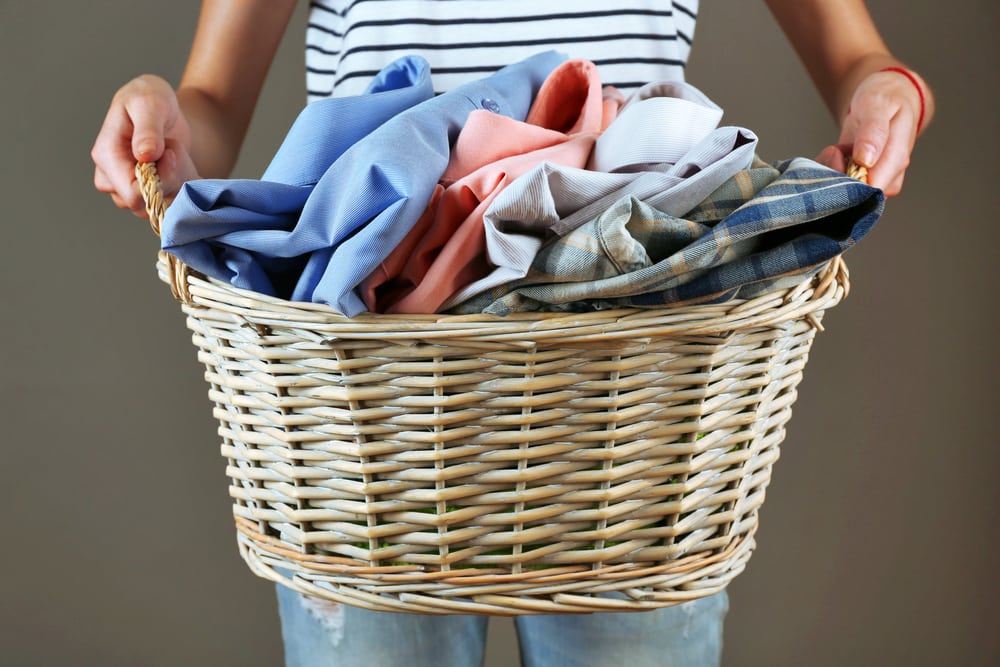Mold and mildew can be a nuisance to deal with, especially if they form on your clothes. Not only are moldy clothes unsightly, but they can also create an unpleasant odor. That’s why it’s important to know how to get mold out of clothes.
Mold stains can develop on clothes from exposure to water or improper storage. For example, you may have left your clothes in a dark and damp place for too long. Another cause may be that your washing machine or dryer contains mold or mildew.
However, with the right products and care, you can save your moldy garments if the mold has only left a few spots. Here are a few general tips for how to remove mold from clothes and fabric.
How to Remove Mold from Clothes
Here’s how to get mold out of clothes step by step.
Read the label
Follow the manufacturer’s instructions about the suggested water temperature for washing and how the clothing items should be dried.
Scrub off the mold stain
Apply a mold stain remover, such as household soap, white vinegar, or bleach, and use a toothbrush to brush off the surface mold. Be gentle and try not to damage the fabric in the process.
Pre-soak the fabric
Since mold stains are hard to remove, you should also pre-soak your stained garment before washing it. Saturate it for one hour in a commercial pre-soak product or a bucket of water with one cup of white vinegar.
Alternatively, you can soak your clothes in a vinegar solution. White vinegar is suitable for disinfecting and cleaning stubborn mold stains like white mold or green mold. First, spray undiluted white vinegar onto the mold-infected areas. To make a vinegar solution, mix equal parts of water and vinegar. Soak your clothes in the solution for 30 minutes before washing them. Make sure never to combine vinegar and bleach.
You can also make a paste of lemon juice and salt to rub on areas that have mold. Leave it for a while, and then wash it off.
Wash your clothes in hot water
Besides being effective at removing bacteria and allergens, hot water also kills mold spores better. Of course, don’t surpass the maximum recommended water temperature to wash your clothing. If you have materials that can’t be washed in the washing machine, take them to the dry cleaner.
Use a mold-killing solution in the washer

Vinegar — Add one or two cups of vinegar per cycle and normal detergent to kill moldy smells and brighten your white fabrics.
Borax — You can use borax in a regular washing cycle, but only with organic fabrics like cotton and linen. Dissolve half a cup of borax in hot water and add it into the machine once it has filled with water.
Baking soda — Baking soda is a natural deodorizer that can help remove musty smells from your clothes. Add half a cup of baking soda to your wash cycle, along with your regular detergent.
Bleach — This substance can kill mold in fabrics, but it can fade colors. So make sure to spot-test first and read the label. Some labels say “no chlorine bleach”. Once you know your clothes won’t be damaged, wash them with normal detergent and one cup of bleach.
After washing your clothes, hang-dry them in the sun
Sunlight has a natural bleaching effect and also helps to kill mold spores in the fabric. Also, a breeze will help improve airflow to your clothes. Avoid using the clothes dryer as heat from this machine can make spots visible and difficult to remove.
If mold stains persist…
Repeat the process if you’ve followed the above steps and the mold stains persist. Alternatively, dye your garment a darker color — this may cover the stain for good.
How to Remove Mold in Washing Machines
If your clothes smell musty right after a wash, mold may be present in your washer. To clean the mold inside the machine, run an empty cycle with hot water and bleach or detergent.
If that doesn’t work, your washer needs to be carefully disassembled, and any detected mold needs to be washed with hot water and a cleaning product. Check out our full guide on removing mold from washing machines.

How to Get Rid of Mold Smell in the Closet
After thoroughly washing and eliminating the mold from clothes, the next step is to check your closet. Addressing the source of the problem is essential; otherwise, your clothing items will smell again.
Since closets are solid, enclosed structures, usually made of wood, there are no gaps or ventilation vents to dry wet clothing. Storing clothes in a closet that aren’t dry can create a breeding ground for mold and musty odors.

Allowing air to flow through your closet can help prevent mold growth and odors. Here are some tips to increase airflow:
- Occasionally open your closet doors.
- Louvered doors are better than solid wood because they allow ventilation.
- Use a small fan and direct it to your closet.
- Opening the windows to let in the fresh air.
For more information, read our guide on removing mold smells from closets.
For Mold Cleanup Services, Contact the PuroClean Professionals!
Now that you’ve learned how to remove mold from clothes, start removing any mold spores in your clothing. Mold makes garments smell musty and can cause serious health problems.
Mold can also grow on other textile items in your home, such as upholstery and carpet. However, dealing with mold on these items – IF they can be salvaged – is more difficult and time-consuming. Call PuroClean for mold removal services. We can properly remove mold on upholstery, mattresses, rugs, and carpet.




 PuroClean of Greer
PuroClean of Greer